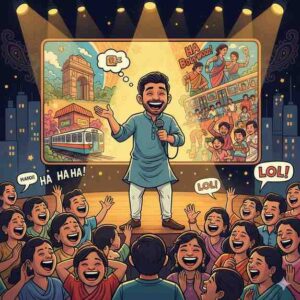A Land of Sacred Roots and Modern Aspirations
Uttar Pradesh (UP), a state revered as the spiritual heart of India, is home to sacred cities like Varanasi, Ayodhya, and Prayagraj that symbolize the pursuit of enlightenment and inner peace. At the same time, the state’s growing urban centers, industrial corridors, and modern lifestyles reflect a shift toward material aspirations. This duality creates a fascinating question: How do the people of UP define success in a landscape where spirituality and materialism coexist, often in tension?
Defining Spiritual Success in Uttar Pradesh
1. A Legacy of Sacred Beliefs
- Pilgrimage and Rituals:
- Cities like Varanasi are synonymous with moksha (liberation), with millions of devotees performing last rites and seeking blessings by the Ganges.
- Festivals such as Kumbh Mela emphasize the pursuit of spiritual merit through ritual baths and communal worship.
- Spiritual Icons:
- Religious figures such as Kabir, Tulsidas, and Swami Vivekananda originated in or were influenced by UP, shaping the spiritual fabric of the state.
2. Inner Fulfillment Over Material Gain
- Cultural Norms:
- For many, success is measured by living a life aligned with dharma (moral duty) and seva (service to others).
- Acts of charity, communal support, and participation in spiritual practices are seen as pathways to fulfillment.
- Simplified Lifestyles:
- In rural areas, contentment often stems from maintaining ancestral traditions, participating in festivals, and fostering community bonds.
The Rise of Material Success
1. Urban Aspirations
- Economic Growth:
- Cities like Noida, Kanpur, and Lucknow are hubs for education, technology, and business, creating a paradigm where success is equated with financial stability and professional achievement.
- Changing Lifestyles:
- The younger generation increasingly values material symbols of success, such as luxury homes, cars, and global exposure.
2. Migration and Ambition
- Rural Exodus:
- Migration to urban centers for better opportunities reflects a shift toward prioritizing economic advancement over traditional rural life.
- Educational Pursuits:
- UP’s expanding focus on higher education and competitive exams has made career achievement a critical marker of success, particularly for families.
The Intersection of Spiritual and Material Goals
1. Festivals and Traditions
- Blending Worlds:
- Festivals like Diwali and Holi bridge spiritual and material realms, where religious rituals coexist with consumerism-driven celebrations.
2. Philanthropy and Community Building
- Modern Charity with Spiritual Roots:
- Wealthy individuals and industrialists often contribute to temples, schools, and hospitals, blending material success with spiritual duty.
3. Balance Among Youth
- Dual Identities:
- Many young people in UP strive for a balance, pursuing careers in urban centers while maintaining a connection to their roots through regular pilgrimages or participation in cultural events.
Challenges in Defining Success
1. Social Pressure and Comparison
- Material Competition:
- In urban areas, societal expectations and peer comparisons often lead to prioritizing wealth over inner fulfillment.
- Spiritual Neglect:
- In pursuit of financial goals, younger generations risk losing touch with traditional values and practices.
2. Economic Inequalities
- Rural vs. Urban Divide:
- While urban residents increasingly define success in material terms, rural communities still grapple with basic needs, complicating their ability to aspire toward either goal.
3. Polarized Narratives
- Conflicting Expectations:
- Societal norms often pit material success against spiritual aspirations, creating tension in how individuals define their goals.
Fostering a Balanced Perspective
- Education on Cultural Heritage
- Introduce school curriculums that emphasize the importance of spiritual and ethical values alongside professional development.
- Promoting Sustainable Lifestyles
- Encourage individuals to pursue material success responsibly, ensuring that it does not come at the cost of community and environmental well-being.
- Reviving Spiritual Practices
- Support local communities in preserving their spiritual traditions, ensuring they remain relevant in modern contexts.
- Encouraging Modern Philanthropy
- Promote wealth-sharing initiatives that align material gains with community welfare and spiritual fulfillment.
Conclusion: A Delicate Balance
Uttar Pradesh’s people continue to navigate the delicate balance between spiritual fulfillment and material success. While urbanization and economic opportunities drive many to prioritize wealth and ambition, the state’s deep-rooted spiritual traditions remind individuals of the value of inner peace, community, and service.
The path to redefining success lies in harmonizing these dualities, where material progress supports, rather than overshadows, spiritual well-being. In this balance, UP’s people can create a model of success that is both deeply rooted in tradition and dynamically aligned with modern aspirations.








